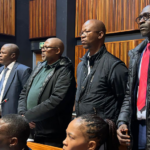Eskom, South Africa's embattled power utility, is cracking down on illegal electricity connections, offering a two-week amnesty period for individuals to regularise their accounts before facing potential arrest and significant fines.
Energy and Electricity Minister Kgosientsho Ramokgopa announced the initiative on Wednesday, providing an update on Eskom’s prepaid metering Key Revision Number (KRN) Rollover Programme. While the programme has seen progress in converting outdated meters, the persistent issue of illegal connections continues to drain Eskom's resources and impact service delivery across the country.
The amnesty, ending on 13 December, targets individuals who have tampered with electricity systems, bypassed meters, or have never had meters but have been consuming electricity illegally. Minister Ramokgopa stressed the urgency of the situation: "This window is a credit control opportunity. Individuals can present themselves, and regularise their accounts, and Eskom will proceed to replace faulty or bypassed meters." Those who fail to comply face significant penalties.
The minister detailed the penalties for those found to have illegally accessed electricity: a fine of up to R6 000, payable in instalments of R500 over 12 months to ease the financial burden. This lenient approach, however, is strictly time-limited. After the deadline, Eskom will intensify its credit control measures, including meter replacements and disconnections, leaving those who continue to illegally access electricity facing the full force of the law.
Ramokgopa highlighted the staggering scale of the problem. He revealed that some customers have been consuming electricity without payment since 2018, underscoring the significant revenue losses Eskom faces. The minister outlined five key categories of customers affected by the programme:
- Bypassed meters: Customers who have illegally bypassed the electricity system.
- Non-metered connections: Individuals who have never had meters but consume electricity illegally.
- Faulty or burnt meters: Customers whose meters are damaged yet continue to access electricity illicitly.
- Conventional meter users: Users not part of the prepaid conversion process, to be addressed separately.
- Prepaid customers with technical issues: Individuals facing genuine technical glitches preventing meter conversion.
The initial phase of the programme focused on legitimate prepaid users, successfully converting approximately 4.9 million customers. However, a significant number remain unconverted due to illegal connections, a figure initially at 2.1 million and now reduced to 1.7 million.
These illegal connections contribute to Eskom's massive monthly revenue loss of R2.5 billion, amounting to R30 billion annually. The situation is even more dire when considering municipal arrears, which reached R90 billion in July 2024. Combined, Eskom and municipalities lose approximately R120 billion annually due to unpaid electricity bills.
Ramokgopa warned that these losses directly impact paying customers: "These losses inevitably impact paying customers. When Eskom and municipalities cannot recover revenue, these shortfalls are factored into tariff applications, resulting in higher electricity costs for compliant consumers.” The financial burden falls disproportionately on those who diligently pay their bills.
The consequences extend beyond financial losses. The lack of revenue impacts infrastructure maintenance and development, hindering municipalities' ability to fulfil their constitutional obligations and leading to the deterioration of essential services.
The minister acknowledged the need to differentiate between non-payers who can afford electricity and indigent households facing economic hardship. While indigent households are eligible for free basic electricity, inefficiencies in subsidy distribution have led to funds being diverted. Eskom plans to address this by using smart meters to deliver subsidies directly to qualifying customers, bypassing intermediaries.
The amnesty period has already yielded positive results. Around 400,000 previously non-compliant customers have regularised their accounts, generating an additional R440 million in monthly revenue for Eskom. This revenue will be used to stabilise and upgrade the electricity distribution network, particularly in areas with high levels of illegal connections, which often experience more frequent load shedding.
Ramokgopa's urgent appeal to the remaining non-compliant customers is clear: comply by the 13 December deadline or face intensified credit control measures. The minister concluded by emphasising the critical role of compliance in ensuring Eskom's sustainability and South Africa's energy future. "Non-compliance not only jeopardises Eskom’s ability to provide electricity but also unfairly burdens paying customers," he stated, leaving no doubt about the seriousness of the situation and the need for immediate action.

Follow Us on Twitter











